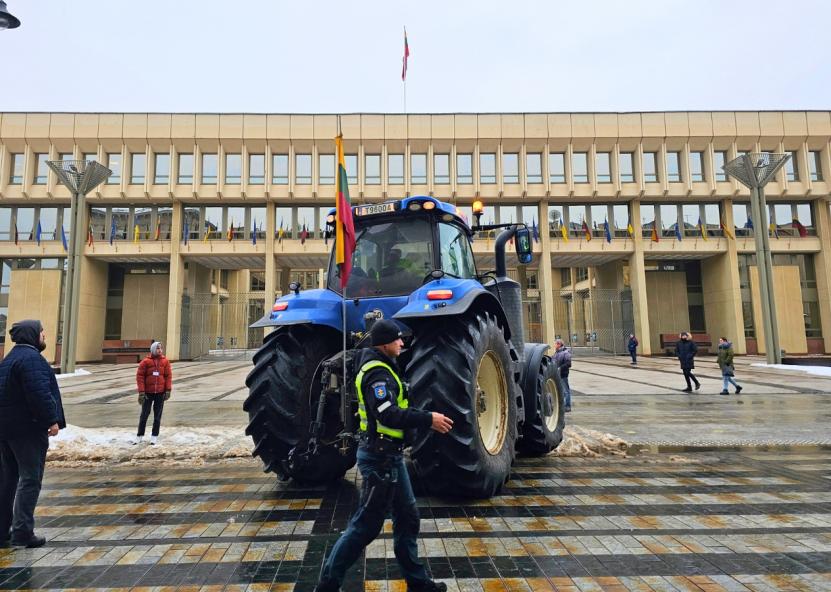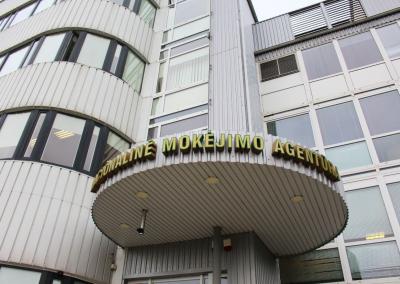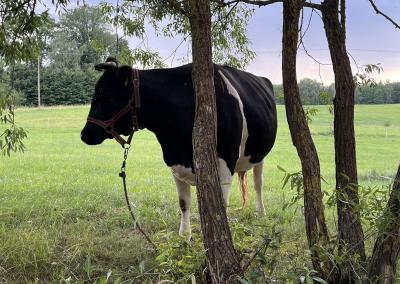EUR 20 million in payments does not reach the Seimas Committee on Rural Affairs
At yesterday's meeting of the Seimas Committee on Rural Affairs, one of the issues of particular concern to farmers, the missing €20 million under the measure „Investments in agricultural holdings“, was not discussed, although before the meeting some members of the Committee had promised that this topic would be dealt with in the same way as the issue of parliamentary control. What happened that in the end the Committee on Rural Affairs did not attempt to clarify the situation at the meeting?
(Non)strict agenda?
„This issue was not on the agenda“, – laconically replied the chairman of the Committee on Rural Affairs, Bronis Ropė, when asked why the shortfall of EUR 20 million in payments under the measure „Investments in agricultural holdings“ was not discussed.
Meanwhile, committee member Kęstutis Mažeika said he did not know why this issue was not included. "If you want a more precise answer, ask the chairman, who now controls the agenda „music“," the MP stressed, and was surprised to learn that his colleague claimed not to have received a single letter or suggestion on the issue.
„Today, the Minister of Agriculture himself hinted that the issue will be discussed in the parliamentary scrutiny. We will certainly have it, I have no doubt about that. Maybe he (i.e. Mr Ropė) doesn't read the letters, I don't know... We will have to have a word on the phone," assured Mažeika.
Will there or will there not be parliamentary control?
B. Ropė was not sure whether the issue of the 20 million payments would indeed be addressed in the next committee meeting.
„There is no draft yet“, – he replied confidently, adding that according to the budget presented by the Minister of Agriculture, he seemed to understand that there were already funds earmarked for arrears. And will parliamentary scrutiny be applied?
„It could be done. The procedure is very simple – put it on the agenda, gather in 1-2 weeks the necessary information on the urgency, the depth of the problem, identify the interested parties. However, as I mentioned earlier, neither the Lithuanian Farmers' Union, nor the Association of Companies, nor the grain farmers, nor the dairy farmers, nor the butchers have come forward on this issue. I have only heard about it as much as you have heard about it – from someone else's story“, – replied the Chairman of the Committee on Rural Affairs.
„We need someone to write this problem down, that it exists and is not just talk. It should be written by an organisation or an individual, a farmer, that they are aggrieved. That would be quite enough," Ropė said.Political responsibility
„In 13 months 4 ministers have changed. Each of them probably had their own ambitions, while the main things remained on the margins. Expectations have been raised, but not accurately calculated. The questions will still have to be answered by the current Minister – give a chronology of decisions. The NMA may also have to prepare its position. The ministry will also have to propose how to get out of this situation without having to wait for a year, two or five years," Mažeika said, adding that it is likely that all responsibility will be shifted to those who worked before, with the blame for mistakes generally being placed on the predecessors.
„But the most important thing is that those farmers who have applied and are now missing payments are not left on the margins. Solutions need to be found and the dots need to be dotted," the MP stressed the need for clarity.Organisations are very busy
It is likely that the issue of the €20 million has not reached Parliament because farmers' organisations have been very busy lately. For example, the Lithuanian Agricultural Council (LAC) is currently organising meetings with farmers in the districts, funded by the Ministry of Agriculture (MAF).
As the Public Relations and Cooperation Department of the Ministry of Agriculture informed "Agrobite", the LFA is organising meetings in 9 different districts, which have been named as discussions on current issues in Lithuanian agriculture, information events, and the Minister of Agriculture A. Palionis, the NMA, and the head of the MoA have been invited to speak at these meetings.
„LFA has applied for support from the state budget to strengthen self-government of farmers in 2025. The application has been assessed by the National Paying Agency (NPA). With the agreement of the Ministry of Agriculture, the Council has been granted the requested EUR 80 000 for events related to the strengthening of farmers' self-management. The Agriculture Council intends to organise 9 information events“, – says the MAA.
LFA submitted its application on 20 May 2025, when the Ministry of Agriculture was headed by Ignas Hofmanas and the Deputy Minister was A. Palionis. For its part, the MAF approved the assessment of the application on 4 August. It was announced at the end of August that Mr Hofmann would not be Minister of Agriculture.
Farming community reconciled?
Jonas Vilionis, chairman of the Lithuanian Agricultural Council (LAC), revealed that he does not intend to address the Seimas Committee on Rural Affairs.
„The bottom line is that the Ministry of Agriculture should have either accepted all the applications that ended up running out of payments, or rejected some. The promise is that the money will come in in January. So basically the money is there, we just have to wait for it– – convinced Mr Vilionis, adding that the Ministry of Agriculture wanted to do better, but it turned out the way it did.
„The Ministry of Agriculture has responded to farmers' requests, postponing deadlines several times, easing conditions so that only all farmers could implement their projects. In addition, as far as is known, there will be talks with banks and other interested representatives that payments will be made, but only at a later date," continued the chairman of the LFA.„Both the Minister and the Ministry as a whole have been doing their best to ensure that only the farmers take all the old money. If the rules had been strictly followed, many would have had to pay back the money or would simply not have received the support. Therefore, I think the Ministry did the right thing," concluded Mr Vilionis.














































































































